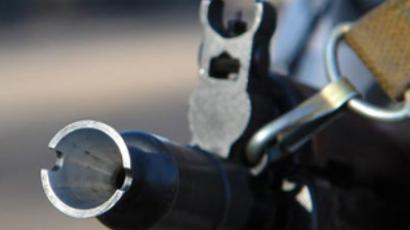ROAR: “Another salvo in terrorists’ war against Russia”

Suicide bombers that carried out attacks on the Moscow Metro were most likely widows of top militants in the North Caucasus, the media say.
The head of the Russian Federal Security Service Aleksandr Bortnikov has said the investigation knows who masterminded the recent terrorist acts. The FSB had obtained “certain materials and detained a number of people,” Bortnikov said at a meeting with Dmitry Medvedev on April 1 in Makhachkala, Dagestan.
Earlier Chechen militant leader Doku Umarov claimed responsibility for the attacks in Moscow and Dagestan. He echoed the assumptions of many analysts who say that the attacks could have been committed as revenge by militants for the recent operations by the Federal Security Forces.
At the same time, the media stressed that the first audio address attributed to Umarov ruled out his responsibility for the terrorist act in Moscow.
Bortnikov said that the version is being confirmed that “the terrorist acts have been carried out by actual armed groups linked to the North Caucasus.”
The special services have identified the female suicide bombers who traveled to Moscow by bus from Kizlyar, Dagestan, accompanied by an unknown man, the Russian media say. However, the information has not been officially confirmed.
The investigators believe that the woman who blew herself up at Lubyanka metro station could have been 17-year-old Djennet Abdurakhmanova (or Abdullaeva, according to other sources). She was the widow of Umalat Magomedov (Al-Bara), a militant leader in Dagestan, Kommersant daily reported.
According to the paper, Magomedov – then already the “Emir of Dagestan” – close to Umarov, was eliminated during a special operation on December 31 last year. Later, the FSB described this operation “as one of the most successful over the recent years” because the leaders of two armed groups were also eliminated, the paper said.
“It is still unclear how Jennet had become a suicide bomber,” the daily noted. “After her husband’s death she was possibly influenced by radical Islamic ideologists like Said Buryatsky who could have persuaded her to sacrifice her life to take revenge for her husband.”
Investigators allegedly found a love-letter on her, written in Arabic, Moskovsky Komsomolets daily said. It does not contain a signature, and it was not clear to whom it had been addressed. “Arabic is rarely used in the Caucasus, and the terrorist could have been prepared at one of the training centers in the Middle East,” an anonymous analyst told the daily.
Sources in special services in Dagestan were uncertain about the suicide bombers’ identities, Gazeta daily said. “These field commanders and ‘emirs’ sometimes usually have up to 10-12 wives,” a source said. “It is difficult to trace each of them,” he added.
Dagestani investigators will try to check all of Al-Bara’s wives for their possible involvement in the attacks. However, they doubt that the suicide bombers were from the republic, the paper said.
“An official statement will most likely be made soon about the absence of the Dagestani trace in the Moscow terrorist acts,” the sources told the paper. Representative of Ingushetia and Chechnya “have already done the same,” the daily noted.
The second suicide bomber has not been identified, but the media quote sources who mention her as Markha Ustarkhanova, either 19 or 20 years old, from Chechnya. She is said to be the widow of militant Said-Emin Khizriev, who was eliminated by special services in October 2009. Khizriev had allegedly prepared an attempt against the life of Chechen President Ramzan Kadyrov.
The media reported Ustarkhanova had left home to join militants after getting acquainted with them over the Internet.
However, a source in law enforcement agencies of Chechnya said Ustarkhanova had not been involved in a terrorist attack in Moscow, RIA Novosti new agency said. At the same time, investigators do not know her whereabouts. She may now be in Turkey.
Federal law enforcement agencies have identified the woman who blew herself up at Park Kultury station, Vedomosti daily reports. She was allegedly a widow of a Dagestani militant leader who had been eliminated this winter, the paper said.
However, the trace of the terrorist attacks in the Metro may lead to the border between Pakistan and Afghanistan, Nezavisimaya Gazeta daily said, adding that it may have been planned and carried out by militants prepared by Al-Qaeda.
Commentators in Pakistan and India say that the terrorist acts were probably organized by militants in the North Caucasus, the paper noted, but they could have been trained in the tribal area on the Pakistan-Afghanistan border. Russian analysts do not rule out “the link between the Chechen underground and Islamic radicals based in South Asia,” the paper noted.
Al-Qaeda is nurturing the idea of creating an Islamic emirate on the territory including parts of Iran, Afghanistan, Pakistan, Tajikistan, Turkmenistan and Uzbekistan, the daily said. The terrorist organization is interested in mutinies in the North Caucasus that could support activities against Russia and its allies in Central Asia, it noted.
The leadership of radical Islamic armed groups is actually based in mountainous regions of Afghanistan and Pakistan, said Vyacheslav Belokrinitsky, deputy director of the Institute of Oriental Studies.
The existence of a breeding ground of religious fanatics in the area of Pashtun tribes influences many hot spots of the world, he added. “The problem is that Pakistan does not control this region,” he told the paper. “So the wave of extremism could have reached Russia.”
The attacks in the Moscow Metro may be just another salvo in a terrorist war against Russia directed from South Asia, the paper said. Some observers believe that followers of radical Islam in the North Caucasus are not necessary directly linked to Al-Qaeda.
Some of them lost their relatives and want to take revenge, Izvestia daily said. “The support that they get from the local population and their families make them very dangerous,” it added.
Sergey Borisov, RT
Russian Opinion and Analytics Review














